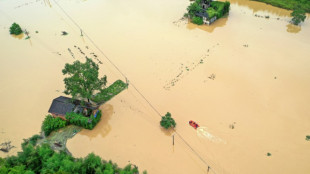
-
 Former Australia coach Langer to take charge of London Spirit
Former Australia coach Langer to take charge of London Spirit
-
Most UK doctors suffer from 'compassion fatigue': poll

-
 Everton boss Dyche unconcerned by Maupay jibe
Everton boss Dyche unconcerned by Maupay jibe
-
FBI probes potential accomplices in New Orleans truck ramming

-
 Secret lab developing UK's first quantum clock: defence ministry
Secret lab developing UK's first quantum clock: defence ministry
-
Premier League chief fears Club World Cup's impact on Man City and Chelsea

-
 US mulls new restrictions on Chinese drones
US mulls new restrictions on Chinese drones
-
Wall Street dons early green after Asia starts year in red

-
 Rosita Missoni of Italy's eponymous fashion house dies age 93
Rosita Missoni of Italy's eponymous fashion house dies age 93
-
27 sub-Saharan African migrants die off Tunisia in shipwrecks

-
 UK grime star Stormzy banned from driving for nine months
UK grime star Stormzy banned from driving for nine months
-
Neil Young dumps Glastonbury alleging 'BBC control'

-
 Djokovic, Sabalenka into Brisbane quarters as rising stars impress
Djokovic, Sabalenka into Brisbane quarters as rising stars impress
-
Swiatek battles back to take Poland into United Cup semis

-
 Electric cars took 89% of Norway market in 2024
Electric cars took 89% of Norway market in 2024
-
Stock markets begin new year with losses

-
 Rival South Korea camps face off as president holds out
Rival South Korea camps face off as president holds out
-
French downhill ace Sarrazin out of intensive care

-
 Djokovic cruises past Monfils as rising stars impress in Brisbane
Djokovic cruises past Monfils as rising stars impress in Brisbane
-
Montenegro mourns after gunman kills 12

-
 Sales surge in 2024 for Chinese EV giant BYD
Sales surge in 2024 for Chinese EV giant BYD
-
Agnes Keleti, world's oldest Olympic champion, dies at 103

-
 Asian stocks begin year on cautious note
Asian stocks begin year on cautious note
-
Andreeva, Mpetshi Perricard showcase Australian Open potential

-
 South Korea police raid Jeju Air, airport over fatal crash
South Korea police raid Jeju Air, airport over fatal crash
-
Perera's 46-ball ton gives Sri Lanka consolation T20 win over New Zealand

-
 Afghan refugees suffer 'like prisoners' in Pakistan crackdown
Afghan refugees suffer 'like prisoners' in Pakistan crackdown
-
Coach tight-lipped on whether Rohit will play in final Australia Test

-
 Blooming hard: Taiwan's persimmon growers struggle
Blooming hard: Taiwan's persimmon growers struggle
-
South Korea's impeached president resists arrest over martial law bid

-
 Knicks roll to ninth straight NBA win, Ivey hurt in Pistons victory
Knicks roll to ninth straight NBA win, Ivey hurt in Pistons victory
-
'Numb' New Orleans grapples with horror of deadly truck attack

-
 Asia stocks begin year on cautious note
Asia stocks begin year on cautious note
-
FBI probes 'terrorist' links in New Orleans truck-ramming that killed 15

-
 2024 was China's hottest year on record: weather agency
2024 was China's hottest year on record: weather agency
-
Perera smashes 46-ball ton as Sri Lanka pile up 218-5 in 3rd NZ T20

-
 South Korea police raid Muan airport over Jeju Air crash that killed 179
South Korea police raid Muan airport over Jeju Air crash that killed 179
-
South Korea's Yoon resists arrest over martial law bid

-
 Sainz set to step out of comfort zone to defend Dakar Rally title
Sainz set to step out of comfort zone to defend Dakar Rally title
-
New Year's fireworks accidents kill five in Germany

-
 'I'm Still Here': an ode to Brazil resistance
'I'm Still Here': an ode to Brazil resistance
-
New Orleans attack suspect was US-born army veteran

-
 Australia axe Marsh, call-up Webster for fifth India Test
Australia axe Marsh, call-up Webster for fifth India Test
-
NorCal Remodeling Group Announces Rebrand and Name Change to True North Kitchen & Bath

-
 5 Tips for Protecting Your Children’s Health
5 Tips for Protecting Your Children’s Health
-
What are the risks of taking out a personal loan?

-
 DirectTrust(R) Announces 2025 Accreditation Criteria Versions for All Accreditation Programs
DirectTrust(R) Announces 2025 Accreditation Criteria Versions for All Accreditation Programs
-
BOK Financial Corporation announces Fourth Quarter 2024 Earnings Conference Call

-
 Firstleaf Reveals Its New Award-Winning Wines And Trend Forecast
Firstleaf Reveals Its New Award-Winning Wines And Trend Forecast
-
Radius Pharmaceuticals Announces Licensing Agreement with Pharmanovia to Register and Commercialize Abaloparatide in China and Select Asia Pacific Territories


In Iran, late Jimmy Carter remembered as 'architect of sanctions'
Iran played a central role in Jimmy Carter's presidency, but in Tehran, where state television branded him the "architect of economic sanctions", many have far from fond memories of the late US president.
The former US president and Nobel Peace Prize laureate, who passed away on Monday at the age of 100, left behind a legacy of punitive measures whose impact on Iran has endured since the 1979 Islamic Revolution.
"Carter had a bad character," said Hassan Taherifar who works at a Tehran bazaar outside the former US embassy in Tehran, known locally as the "Den of Spies".
"Instead of supporting our nascent revolution, he opened a spy centre in our country," Taherifar added.
Others expressed stronger emotions. "He will rot in hell," one man in his 50s who did not give his name said outside the building.
Iran's state TV announced Carter's death by describing him as the "architect of economic sanctions" on the Islamic republic.
"Carter's failure... to properly deal with Iran, made his presidency short, only one term," said the reporter.
Under Iran's last shah, Mohammad Reza Pahlavi, Iran and the United States enjoyed close relations. During a 1977 visit by Carter to Iran, he called it "an island of stability in one of the more troubled areas of the world."
However, relations dramatically soured after the 1979 Islamic Revolution led by Ayatollah Ruhollah Khomeini.
On November 4, 1979, students loyal to Khomeini stormed the US embassy in Tehran, taking 52 staff hostage, an event that has shaped Iran-US relations for decades.
They demanded Washington hand over the recently toppled shah, who was being treated in the United States for cancer.
The hostages were held for 444 days, a period including the 1980 US presidential elections that Carter went on to lose.
The hostage-taking placed immense pressure on Carter, who authorised in April 1980 a top-secret military rescue mission that ended in disaster with the killing of eight US servicemen.
Washington officially broke off relations with Tehran in 1980, midway through the crisis, and they have never been restored.
The hostages were finally freed on January 20, 1981, on the day Carter's successor, Ronald Reagan, was sworn in as president.
Today, the former US embassy building serves as a museum, with a portrait of Carter still hanging on the wall of what was once the ambassador's office.
"Carter wasn't good to us," said 60-year-old Alireza, who runs an insurance company.
"This incident (the hostage crisis) had a great impact on relations between Iran and America and Carter's role was negative," he added.
While US sanctions on Tehran outlasted Carter, the late president backed a landmark nuclear deal with Iran in 2015 which provided sanctions relief in exchange for limits on Iran's nuclear programme.
The deal fell apart after then-president Donald Trump unilaterally withdrew the United States in 2018 and reimposed heavy sanctions on Iran.
In a 2014 interview with CNBC, Carter said he could have been re-elected to a second term if he had taken military action against Iran during the hostage crisis.
"It would have shown that I was strong and resolute and manly," the former president said.
"I could have wiped Iran off the map with the weapons that we had."
"But in the process, a lot of innocent people would have been killed, probably including the hostages."
M.A.Colin--AMWN